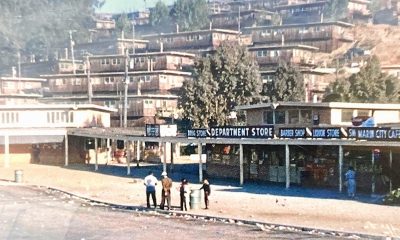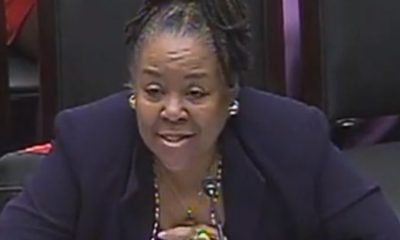Activism
Oakland Jehovah’s Witnesses Return to Door-to-Door Ministry After 30-Month Pandemic Pause
“We believe that the early decision to shut down all in-person activities for more than two years has saved many lives,” said Robert Hendriks, U.S. spokesperson for Jehovah’s Witnesses. “We’re now ready and eager to reconnect with our neighbors once again – person to person, face to face. It’s not the only way that we preach, but it has historically been the most effective way to deliver our message of comfort and hope.”

By Alan Mobley
Jehovah’s Witnesses resumed their trademark door-to-door ministry after a two-and-a-half-year suspension, just in time for their September launch of a global campaign featuring an interactive program for Bible study.
The decision to resume their door-to-door ministry marked the complete restoration of all pre-pandemic in-person activities for the nearly 1.3 million Jehovah’s Witnesses in the 12,000 congregations in the United States.
Houses of worship (called Kingdom Halls) were reopened on April 1, witnessing in public places resumed on May 31, and in-person conventions are again being planned for 2023.
“I have had a great time reintroducing myself to my neighbors,” said lifelong Oakland resident Aaron Elder, who has begun visiting people at their homes again with his wife, Natasha. “People have been very friendly. I think many are concerned about the state of the world and are eager to talk about something positive.”
The suspension of the public ministry was a proactive response by the organization to keep communities and congregants safe. The move was also unprecedented. Jehovah’s Witnesses had been preaching from house to house without interruption for more than 100 years including World War I, the Great Depression, World War II and further global unrest, but COVID-19 demanded a different response.
“We believe that the early decision to shut down all in-person activities for more than two years has saved many lives,” said Robert Hendriks, U.S. spokesperson for Jehovah’s Witnesses. “We’re now ready and eager to reconnect with our neighbors once again – person to person, face to face. It’s not the only way that we preach, but it has historically been the most effective way to deliver our message of comfort and hope.”
The return to an in-person ministry coincides with a global campaign to offer an interactive Bible study program, available in hundreds of languages and offered at no cost.
The course comes in the form of a printed book, online publication or as an embedded feature within the organization’s free mobile application, JW Library. Released in late 2020, the interactive study platform combines text, video, illustrations and digital worksheets to help learners of all ages.
“This study program is designed to match the learning style of the 21st-century student,” said Hendriks. “We’re excited to begin sharing it with our neighbors as we return to making personal visits.”
The pandemic forced Jehovah’s Witnesses to quickly pivot to virtual meetings and conventions while conducting their ministry exclusively through letters, phone calls and virtual Bible studies.
This has led to growth in meeting attendance and the number of congregants, with more than 400,000 newly baptized Witnesses joining the ranks of 120,000 congregations globally in just the first two years of the pandemic.
For more information about Jehovah’s Witnesses, their history, beliefs and activities, visit their official website, jw.org, with content available in more than 1,000 languages.
Alan Mobley is the public communications representative for the U.S. office of Jehovah’s Witnesses.
Activism
Oakland Post: Week of April 24 – 30, 2024
The printed Weekly Edition of the Oakland Post: Week of April 24 – 30, 2024

To enlarge your view of this issue, use the slider, magnifying glass icon or full page icon in the lower right corner of the browser window. ![]()
Activism
Oakland Post: Week of April 17 – 23, 2024
The printed Weekly Edition of the Oakland Post: Week of April 17 – 23, 2024

To enlarge your view of this issue, use the slider, magnifying glass icon or full page icon in the lower right corner of the browser window. ![]()
Activism
Oakland Schools Honor Fred Korematsu Day of Civil Liberties
Every Jan. 30, OUSD commemorates the legacy of Fred Korematsu, an Oakland native, a Castlemont High School graduate, and a national symbol of resistance, resilience, and justice. His defiant stand against racial injustice and his unwavering commitment to civil rights continue to inspire the local community and the nation. Tuesday was “Fred Korematsu Day of Civil Liberties and the Constitution” in the state of California and a growing number of states across the country.

By Post Staff
Every Jan. 30, OUSD commemorates the legacy of Fred Korematsu, an Oakland native, a Castlemont High School graduate, and a national symbol of resistance, resilience, and justice.
His defiant stand against racial injustice and his unwavering commitment to civil rights continue to inspire the local community and the nation. Tuesday was “Fred Korematsu Day of Civil Liberties and the Constitution” in the state of California and a growing number of states across the country.
One OUSD school is named in his honor: Fred T. Korematsu Discovery Academy (KDA) elementary in East Oakland.
Several years ago, founding KDA Principal Charles Wilson, in a video interview with anti-hate organization “Not In Our Town,” said, “We chose the name Fred Korematsu because we really felt like the attributes that he showed in his work are things that the children need to learn … that common people can stand up and make differences in a large number of people’s lives.”
Fred Korematsu was born in Oakland on Jan. 30, 1919. His parents ran a floral nursery business, and his upbringing in Oakland shaped his worldview. His belief in the importance of standing up for your rights and the rights of others, regardless of race or background, was the foundation for his activism against racial prejudice and for the rights of Japanese Americans during World War II.
At the start of the war, Korematsu was turned away from enlisting in the National Guard and the Coast Guard because of his race. He trained as a welder, working at the docks in Oakland, but was fired after the bombing of Pearl Harbor in 1941. Fear and prejudice led to federal Executive Order 9066, which forced more than 120,000 Japanese Americans out of their homes and neighborhoods and into remote internment camps.
The 23-year-old Korematsu resisted the order. He underwent cosmetic surgery and assumed a false identity, choosing freedom over unjust imprisonment. His later arrest and conviction sparked a legal battle that would challenge the foundation of civil liberties in America.
Korematsu’s fight culminated in the Supreme Court’s initial ruling against him in 1944. He spent years in a Utah internment camp with his family, followed by time living in Salt Lake City where he was dogged by racism.
In 1976, President Gerald Ford overturned Executive Order 9066. Seven years later, the 9th Circuit Court of Appeals in San Francisco vacated Korematsu’s conviction. He said in court, “I would like to see the government admit that they were wrong and do something about it so this will never happen again to any American citizen of any race, creed, or color.”
Korematsu’s dedication and determination established him as a national icon of civil rights and social justice. He advocated for justice with Rosa Parks. In 1998, President Bill Clinton gave him the Presidential Medal of Freedom saying, “In the long history of our country’s constant search for justice, some names of ordinary citizens stand for millions of souls … To that distinguished list, today we add the name of Fred Korematsu.”
After Sept. 11, 2001, Korematsu spoke out against hatred and discrimination, saying what happened to Japanese Americans should not happen to people of Middle Eastern descent.
Korematsu’s roots in Oakland and his education in OUSD are a source of great pride for the city, according to the school district. His most famous quote, which is on the Korematsu elementary school mural, is as relevant now as ever, “If you have the feeling that something is wrong, don’t be afraid to speak up.”
-

 Activism4 weeks ago
Activism4 weeks agoOakland Post: Week of March 27 – April 2, 2024
-

 #NNPA BlackPress4 weeks ago
#NNPA BlackPress4 weeks agoBeloved Actor and Activist Louis Cameron Gossett Jr. Dies at 87
-

 Community1 week ago
Community1 week agoFinancial Assistance Bill for Descendants of Enslaved Persons to Help Them Purchase, Own, or Maintain a Home
-

 Activism3 weeks ago
Activism3 weeks agoOakland Post: Week of April 3 – 6, 2024
-

 Business1 week ago
Business1 week agoV.P. Kamala Harris: Americans With Criminal Records Will Soon Be Eligible for SBA Loans
-

 Activism2 weeks ago
Activism2 weeks agoOakland Post: Week of April 10 – 16, 2024
-

 Community1 week ago
Community1 week agoAG Bonta Says Oakland School Leaders Should Comply with State Laws to Avoid ‘Disparate Harm’ When Closing or Merging Schools
-

 Community6 days ago
Community6 days agoOakland WNBA Player to be Inducted Into Hall of Fame

























































